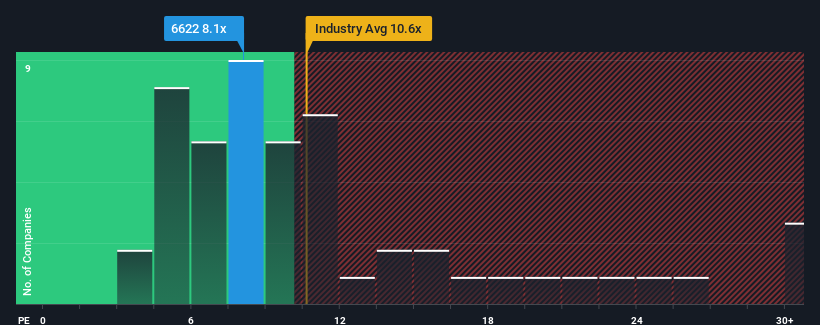- Japan
- /
- Electrical
- /
- TSE:6622
Investors Don't See Light At End Of DAIHEN Corporation's (TSE:6622) Tunnel And Push Stock Down 34%
Unfortunately for some shareholders, the DAIHEN Corporation (TSE:6622) share price has dived 34% in the last thirty days, prolonging recent pain. Longer-term, the stock has been solid despite a difficult 30 days, gaining 10% in the last year.
Although its price has dipped substantially, DAIHEN may still be sending bullish signals at the moment with its price-to-earnings (or "P/E") ratio of 8.1x, since almost half of all companies in Japan have P/E ratios greater than 14x and even P/E's higher than 21x are not unusual. However, the P/E might be low for a reason and it requires further investigation to determine if it's justified.
Recent times have been advantageous for DAIHEN as its earnings have been rising faster than most other companies. One possibility is that the P/E is low because investors think this strong earnings performance might be less impressive moving forward. If not, then existing shareholders have reason to be quite optimistic about the future direction of the share price.
View our latest analysis for DAIHEN

How Is DAIHEN's Growth Trending?
In order to justify its P/E ratio, DAIHEN would need to produce sluggish growth that's trailing the market.
Taking a look back first, we see that the company grew earnings per share by an impressive 25% last year. The latest three year period has also seen an excellent 78% overall rise in EPS, aided by its short-term performance. So we can start by confirming that the company has done a great job of growing earnings over that time.
Turning to the outlook, the next three years should generate growth of 5.2% per year as estimated by the five analysts watching the company. That's shaping up to be materially lower than the 9.6% each year growth forecast for the broader market.
In light of this, it's understandable that DAIHEN's P/E sits below the majority of other companies. Apparently many shareholders weren't comfortable holding on while the company is potentially eyeing a less prosperous future.
What We Can Learn From DAIHEN's P/E?
The softening of DAIHEN's shares means its P/E is now sitting at a pretty low level. It's argued the price-to-earnings ratio is an inferior measure of value within certain industries, but it can be a powerful business sentiment indicator.
We've established that DAIHEN maintains its low P/E on the weakness of its forecast growth being lower than the wider market, as expected. At this stage investors feel the potential for an improvement in earnings isn't great enough to justify a higher P/E ratio. Unless these conditions improve, they will continue to form a barrier for the share price around these levels.
It's always necessary to consider the ever-present spectre of investment risk. We've identified 3 warning signs with DAIHEN (at least 2 which don't sit too well with us), and understanding them should be part of your investment process.
It's important to make sure you look for a great company, not just the first idea you come across. So take a peek at this free list of interesting companies with strong recent earnings growth (and a low P/E).
New: Manage All Your Stock Portfolios in One Place
We've created the ultimate portfolio companion for stock investors, and it's free.
• Connect an unlimited number of Portfolios and see your total in one currency
• Be alerted to new Warning Signs or Risks via email or mobile
• Track the Fair Value of your stocks
Have feedback on this article? Concerned about the content? Get in touch with us directly. Alternatively, email editorial-team (at) simplywallst.com.
This article by Simply Wall St is general in nature. We provide commentary based on historical data and analyst forecasts only using an unbiased methodology and our articles are not intended to be financial advice. It does not constitute a recommendation to buy or sell any stock, and does not take account of your objectives, or your financial situation. We aim to bring you long-term focused analysis driven by fundamental data. Note that our analysis may not factor in the latest price-sensitive company announcements or qualitative material. Simply Wall St has no position in any stocks mentioned.
Have feedback on this article? Concerned about the content? Get in touch with us directly. Alternatively, email editorial-team@simplywallst.com
About TSE:6622
DAIHEN
Manufactures, sells, and repairs transformers, welding machines, industrial robots, and power sources.
Excellent balance sheet established dividend payer.
Similar Companies
Market Insights
Community Narratives




